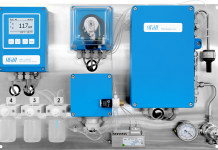Central to encouraging innovation is partnership, as illustrated by the recent work of a UK based consortium, including CPI, that has developed unique techniques for the continuous production of high value pharmaceuticals.
The new reactor technologies developed will enable high value chemicals, including pharmaceuticals that have traditionally been made in batches, to be produced in a continuous manner, together with an increased level of automated control leading to products that are of a higher quality, greater consistency and are produced at lower cost. According to the consortium, the developments have the potential to transform many formulating sectors.
The two year Innovate UK project, which also involved AstraZeneca, Perceptive Engineering Limited and CMAC at The University of Strathclyde, developed three demonstration scale systems; a flow reactor system at CPI and two continuous crystallisers at the University of Strathclyde. In addition to the reactors, the project has also established novel control design and analytical techniques to complement the reactors. The software produced enables the reactors to reach optimum performance quickly and efficiently as the manufacturer switches between products.
Neville Slack, Project Manager at CPI, said: “The project has demonstrated very good performance and cost benefits across a number of continuous reactors. Technically it has shown that model predictive control can be used to deliver true operational benefits through improving the flexibility of production. “Going forward, the systems will allow the pharmaceutical industry to move away from the traditional batch processing of high value/low volume products and move towards more cost effective and environmentally sustainable continuous manufacturing systems.
“The achievements will not only benefit SMEs by allowing them to exploit advanced control and modelling technologies without the need for in-house expertise but also multinational pharmaceutical companies who wish to speed up and optimise their new product development. ” Another example of what can be achieved with the right support is the success of specialist UK engineering firm Whitefox Technologies, which has made a major breakthrough in the US market with its energy and water-efficient membrane solution for ethanol production.
The London-based business has signed a technology licence and purchase agreement for an industrial scale system with California-based Pacific Ethanol and an agreement on a Whitefox solution for Iowa-based Pine Lake Corn Processors. The deals came after successful trials of a demonstration plant last year at Pacific Ethanol, which opened up potential markets for energy and water-efficient ethanol production and similar applications with a market value running into billions of dollars. Whitefox delivers membrane solutions for a variety of solvent applications and chemical reactions to improve productivity and reduce water and energy use and Operating Officer Trond Heggenhougen said: “It’s extremely difficult to get into the US market. When you first do it, it is very significant. That’s why this is so exciting.
“We are also addressing global problems of an increasing population with limited supplies of water and energy. The Whitefox bolt-on solution is attractive to a US ethanol industry that needs to improve its productivity to remain competitive and is increasingly required to meet exacting environmental standards being introduced by state legislators.” Whitefox has taken part in two ‘clean and cool’ missions to San Francisco and Brazil, events run by Innovate UK and UK Trade and Investment to help ambitious entrepreneurs with innovative products to meet new project partners, customers, suppliers and investors in other countries. Trond said: “I went on the Clean and Cool Mission to San Francisco in 2012. I was able to speak to key stakeholders, industry players and potential customers and get advice and support from mission sponsors.
“It’s important. It helps you to get a foothold in the market. Since then we have had help with getting customers from the UKTI in San Francisco and particularly from the UKTI in Chicago. Whitefox says it has also benefited from maintaining the contacts among fellow participants in the missions and from building on its networking through industry events and conferences. The company has grown from 12 to 18 employees over the past year and expects to be 25-to-30 strong by the end of this year. It expects to grow further as it exploits market opportunities in North America and Europe.














